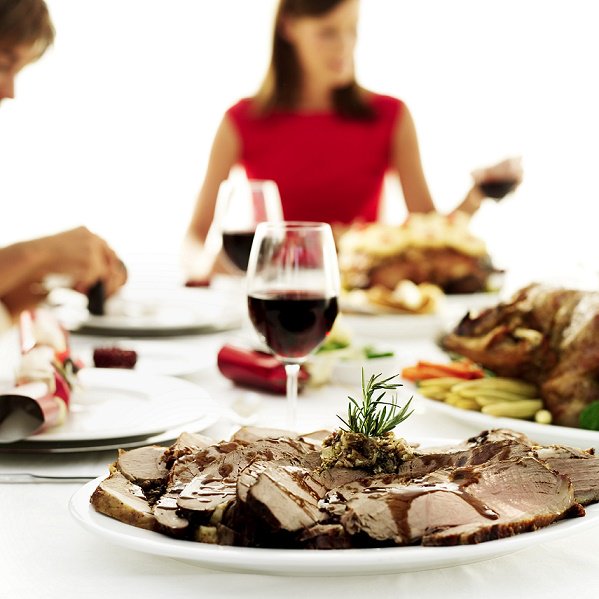By: Lindsey Tucker, R.D., L.D. & Molly Caradonna, Psy.D., L.P.
It’s that special time of year…the holiday season! When you think of the holidays, what do you picture? It may be a house filled with family and friends, a lavish dining room table topped with a holiday feast, the sound of a football game on TV, or a warm pie dripping with whipped cream. Hallmark moments at their best, right?
For many of us, these conjured images of a “picture-perfect” holiday are a far cry from what we will experience this Thursday and the holidays ahead. As co-workers and friends animatedly chat about the upcoming holiday, you may spend your week silently preparing for the challenging interactions you know are in store. A house filled with family and friends may present a battleground on which you face your relatives, your food, and yourself.
Relationships are dynamic and complex. It is not uncommon to have traditions or experiences that you eagerly anticipate about your holiday gatherings, while ALSO dreading awkward encounters or tense conversations that you hope to avoid. And then there is food. Many people enter the holidays with nervousness or apprehension about how to approach food, and maybe in search of a plan for approaching holiday meals that is a good fit for them and their personal needs. So now, let’s pair these two complicated relationships: your personal relationships and your relationship with food. What a recipe for anxiety (pun intended)!
Here at Cashman Center, we understand Hallmark is not reality. In our experiences as a registered dietitian and a clinical psychologist, we have heard many stories about common “characters” that show up at the holidays. We want to normalize these interactions and offer you some skills with which to arm yourself.
Below you will find some of the common holiday offenders we encounter, as well as tips to make it through this holiday season relatively unscathed.
- Food Pusher
The FP looks for and offers care and validation through feeding those around them. The FP also doesn’t take no for an answer.
- What they say: “Here, take another slice of pie. I made extra pie because I know how much you love it.”
- What you hear: “I don’t care if you are full. If you don’t take this pie, I will be hurt. Don’t you love me?”
- Diligent Dieter
Always on a new diet, the DD loves to share all about his or her newfound weight loss, healthy recipes, and loose research on nutrition.
- What they say: “I haven’t eaten any carbs for 4 weeks. I lost 25 lbs and feel amazing! You should totally try it! Here, taste the low-carb, kale bread I brought for everyone. I wouldn’t touch those regular rolls with a ten-foot pole!”
- What you hear: “Just look at all those carbs you have on your plate. You definitely don’t need those. Also, you need to lose some weight.”
- Negative Narrator
As far as the NN is concerned, food is the enemy and we cannot trust it, nor can we trust ourselves around it.
- What they say: “I can’t believe we ate all of that food and now we are eating pie too! I know I’m going to regret this tomorrow when I have to spend the day at the gym burning it all off. You need to come with me.”
- What you hear: “You should feel guilty about all the food you just consumed. We are gluttonous and will need to ‘fix’ this tomorrow.”
- Pageant Judge
The PJ seems to enjoy, well, judging. He or she takes it upon themselves to let you know how you look AND how you should feel about how you look. The PJ often prefers passive aggressive communication.
- What they say: “I’m impressed you had the confidence to wear skinny jeans to Thanksgiving…and with your body type! Wow, good for you!”
- What you hear: “I can’t believe you wore skinny jeans with that body type. What were you thinking?! Yikes.”
Anything sound familiar? Noticing any anxiety or discomfort creeping into your gut? Fear not! With some purposeful thought about the situations and/or people that will be present at your holiday, you can prepare yourself with ways to keep the holiday cheer alive and well. Here are some strategies for managing the interaction between your relationships and food this holiday season:
- Cope Ahead
A strategy from Linehan’s Dialectical-Behavioral Therapy, this skill helps you to prepare in advance for a situation that you anticipate will be challenging. It is comprised of four components:
- Describe a situation that is likely to prompt an emotion you want to decrease.
- Decide what coping or problem-solving skills you want to use in the situation.
- Imagine the situation in your mind as vividly as possible.
- Rehearse in your mind coping effectively (your actions, your thoughts, what you say, and how you will say it).
EXAMPLE
- Perhaps you anticipate that the Pageant Judge (your Aunt Beth) will be at your holiday gathering. Practicing Cope Ahead might look like this:
- Describe: “I imagine that my Aunt Beth will inevitably comment on my clothing choice (like she always does), which will make me feel self-conscious, uncomfortable, and frustrated. I would like to decrease the likelihood that I will feel this way during our holiday dinner.”
- Decide: “I think it will be helpful to change the subject and invite someone else into the conversation if I’m feeling uncomfortable with my aunt’s comments.”
- Imagine: You now imagine, in GREAT detail, the interior of your grandmother’s home who is hosting the gathering, the people there (what they are wearing and where they are sitting), and then when/where/how your aunt approaches you and how that might make you feel.
- Rehearse: You now rehearse the assertive communication that you would like to use.
- Aunt Beth: “Wow, those leggings sure are something! I don’t think I would be okay letting everyone see my legs if I were you.”
- You: “They’re very comfortable. You know, I never heard the details about your recent promotion. How exciting! Hey, Claire, did you hear about this yet? Tell us more about it, Aunt Beth!”
- Distraction
Having some positive distractions on hand can be helpful for self-soothing and getting grounded in emotionally-charged situations. Some suggestions may be: a good book, a crossword puzzle, adult coloring books, knitting, or a card game. You may find a cozy corner, take a quick trip to the bathroom, or invite others to join you with these distractions. These won’t necessarily “fix” a stressful situation, but can certainly be helpful for shifting any negative emotions.
- Assertiveness
Believe it or not, it is absolutely appropriate to communicate when others have crossed your boundaries or made you feel uncomfortable. Using “I language” (I feel _____ when _____), allows others to hear your concerns and respond. For example, should the Food Pusher insist upon having a second helping when you are full, you may respond by saying, “I feel guilty when I’m asked to take more when I am full. I so appreciate the hard work that you put into the mashed potatoes, and I am done with dinner. Thank you Grandma.” While assertiveness sometimes feels hard to exercise (especially if it’s new for you), it is helpful for having our needs honored and teaching those around us what our needs are!
- Enlist Your Holiday Allies
It may be helpful to identify helpful people in your life who can offer you support before, during, and/or after holiday gatherings. You may work with a therapist who can help you plan for stressful gatherings. You may have a cousin who totally gets why your brother drives you crazy and will offer you a supportive look across the room as he tells another tasteless joke. You may have a young nephew that you want to sit next to during dinner, because of how he makes you laugh. Or maybe, you have a friend you can text for emojis of encouragement during the party. Whoever these supportive people are for you, it may be great idea to surround yourself with them this holiday season, and yes – that may mean asking for their support in advance. You are worth it!
These are just a few examples of coping skills and strategies that can be used for managing those tricky holiday gatherings. Use these ideas to develop your own holiday coping plan, or bring into your therapist for further support. Being skillful and intentional going into the holidays can help you feel grounded and empowered this holiday season.
Did this blog hit home for you? Would you like to further explore your relationship with food? Lindsey and Molly are available for nutritional counseling and individual therapy to further explore your relationship with food and your body. Also, be on the lookout for a new group at Cashman Center about understanding and improving your relationship with food and your body….coming in January!
Reference:
Linehan, M. M. (2014). DBT skills training manual second edition (2nd ed.). New York, NY: Guilford Press.






